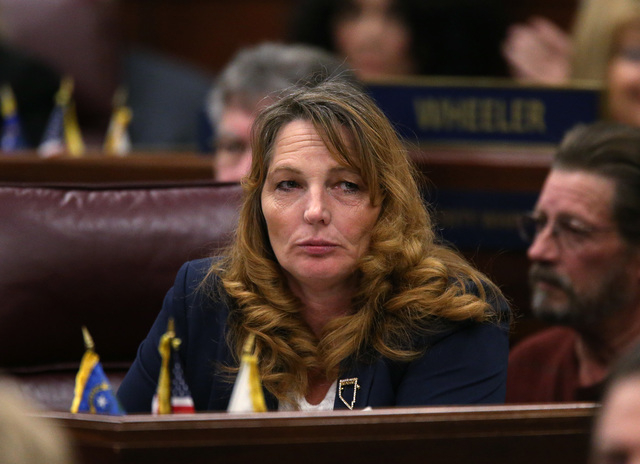Lawmakers: No intention to continually raise net metering cap

CARSON CITY — Two lawmakers with long experience in crafting Nevada’s rooftop solar policy said Wednesday they never intended to continually raise the net metering cap beyond the 3 percent level now in law.
Assembly Minority Leader Marilyn Kirkpatrick, D-North Las Vegas, and state Sen. Kelvin Atkinson, D-Las Vegas, said the state’s current net metering policy, which allows rooftop solar customers to receive a credit for the excess electricity they generate, was intended to help the fledgling industry get off the ground in Nevada.
There was never an intent to raise the net metering cap to 10 percent as has been informally discussed this session, Atkinson said.
Kirkpatrick agreed, saying the subsidy to net metering customers was not intended to continue or increase in perpetuity.
Their comments came during an Assembly Commerce and Labor Committee hearing on a bill that would send the controversial issue to state regulators to resolve. The panel took no immediate action on the bill.
Rooftop solar advocates have been arguing all session that the 3 percent current net metering cap could be hit as early as this summer. Without an increase, the industry would not be able to continue to operate in Nevada, threatening 6,000 rooftop solar jobs, according to industry officials.
But there appears to be no appetite this session to raise the net metering cap.
Instead, state Sen. Patricia Farley, R-Las Vegas, has proposed that the Nevada Public Utilities Commission resolve the issue.
Senate Bill 374, which passed the Senate unanimously Sunday, would ask regulators to study the need for a separate rate class for net metering customers. The PUC would set the new tariff for net metering customers by Dec. 31, based on a study now underway by NV Energy. The PUC could set an interim tariff if the cap was reached to ensure the industry did not come to a standstill.
The new tariff would essentially eliminate the need for a net metering policy.
But SolarCity CEO Lyndon Rive said the concern with the bill is that if the cap is reached before the new rules take effect, business would fall off during that period because of the uncertainty about what rates will be in effect. He asked that the bill be amended to have the old rules stay in effect until the new policy is adopted.
Dan Jacobsen, technical staff manager for the Nevada consumer advocate, testified in support of the bill, saying it would ensure that the rooftop solar industry would not come to an abrupt halt if the 3 percent cap is reached while the regulatory process is underway.
It also provides protections for existing net metering customers who got into rooftop solar under the current policy, he said.
But the PUC should have the ability to adopt rates that have cost recovery from net metering customers for that portion of the utility system that they use, Jacobsen said.